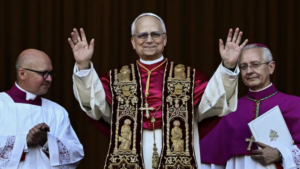
Does the Latter-day Saint Belief in the Existence of “Heavenly Mother” Make them Pagans/Polytheists?
The generally accepted term for pagan is someone who holds religious beliefs other than those of the principal or recognized religions. Calling something pagan then becomes as meaningless as calling something a cult. Yes, it’s common for people to call anything they don’t like pagan or cult, and it’s especially easy to do if the thing they’re denouncing is a minority position.
The majority opinion is never a reliable arbiter of truth.
A polytheist is someone who believes in or worships more than one god. So, what is meant by “believes in”? Believing something is acknowledging its existence or accepting such a possibility. For example, I believe France exists. I’ve never been to France, but I’ve known people who have gone there, and seen enough other evidence to convince me of France’s reality.
Believing in something takes that belief to another level, to where you can expect that thing to do something for you. If I want to believe in France enough, such a belief might compel me to move to France, apply for French citizenship, and claim protection under French laws.
See the difference? Acknowledging something’s existence is not the same as devoting time, attention, and effort toward that thing with an expectation for some sort of benefit.
In the Bible we read, “Thou believest that there is one God; thou doest well: the devils also believe, and tremble” (James 2:19). James inserted this in the middle of his discourse on how faith depends on works, making the point that while the devils believe that God is real (and tremble at that truth), they’re devils because they don’t have faith in God.
So, when it comes to worship, where do Latter-day Saints put their devotion?
We worship God the Father in the name of Jesus Christ by the power of the Holy Ghost.
Can there be other Gods? We are all *children of God, and children have the potential to become like their parents. So, if one of God’s children attained the same glory, would I worship him? He wouldn’t be my father, so no.
I love what Rabbi Jared Kushner said when speaking at Brigham Young University (emphasis mine):
When we say, in your tradition and in mine, that there is only one God, that is not a mathematical statement; it is a moral statement. To affirm that there is one God is not the census report from heaven—we went up to count divine beings and couldn’t come up with more than one. To say that there is only one God is to claim that there is such a thing as right and wrong. If there are many gods, you cannot talk about absolute right and wrong.
Do you remember what it was like in the Iliad during the Trojan War? What one god permits, another god forbids. What one god favors, another god denounces. In a world of many equally powerful deities, the issue is not “What does God want of us?” The issue is “Which god shall I serve? Which god has the power to bless and protect me?” But if there is a single God, then you can claim He has built into the world standards of right and wrong, of moral good and evil, as fixed as the laws of gravity. You cannot claim it is all right to betray your marriage and commit adultery—even if a majority of the people want it that way—any more than you can claim winter should be mild and ice cream should be more nourishing than vegetables. There are some things that simply are there.
Latter-day Saints are not polytheists, even though we can and do acknowledge that more than one being possesses the attributes and authority of God. When Jesus prayed that we would be one as He and the Father are one, do you suppose He wanted us to all combine into the same being? I seriously doubt that.
The Dutch have a phrase, “Ik ben met u eens,” which they use when they express agreement with someone else. It translates in English as “I am one with you.” That is how I understand the unity God the Father has with His Son Jesus, and with the Holy Ghost. I also believe that describes the relationship between our Father in Heaven and Mother in Heaven: they are in complete agreement and unity, acting in perfect harmony as they complement each other in their roles.
If the idea of a Heavenly Mother sounds too outrageous to accept, think about this: how could there be a Father without a Mother?
Why do we not pray to Heavenly Mother? Because we haven’t been instructed to. We have been instructed to pray to the Father in the name of Jesus, so that is what Latter-day Saints do. Like almost everything else in heaven, information about Heavenly Mother is given on a need-to-know basis, and we mortals simply don’t need to know more at this time.
This article originally appeared on Quora.









